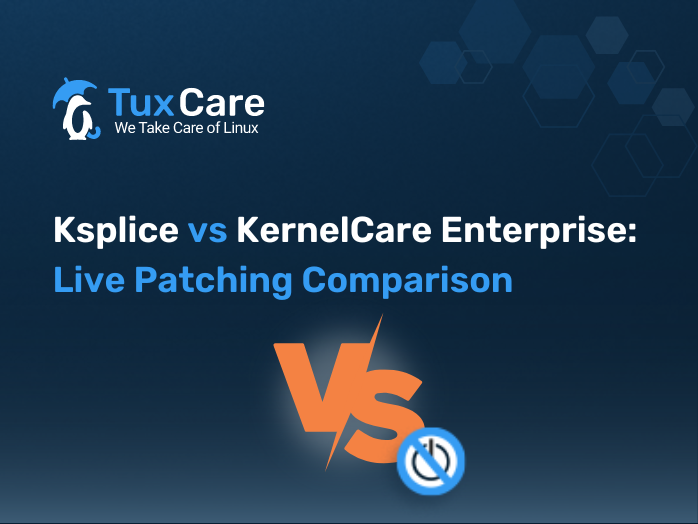Ksplice vs KernelCare Enterprise: Live Patching Comparison
Not all Linux live patching solutions are created equal. In fact, many live patching solutions are quite limited. Oracle’s Ksplice is an example of a limited live patching tool, which only patches vulnerabilities for Oracle Linux.
TuxCare’s KernelCare Enterprise, on the other hand, offers much more flexibility and a number of benefits you won’t find in Ksplice, including patching vulnerabilities for several Linux distributions.
To get an idea of the pros and cons of each of these live patching solutions, let’s do a side-by-side comparison – which may help you decide which live patching approach is best for your own organization.
What is Ksplice?
Ksplice is an open-source Linux kernel extension that allows security updates to be deployed to a running kernel without requiring a reboot, therefore eliminating downtime and enhancing availability. Only patches that do not make major semantic modifications to the kernel’s data structures are supported by Ksplice, and this live patching solution only supports vulnerabilities on Oracle Linux – lacking an ability to patch other Linux distributions..
What is KernelCare?
KernelCare is a live kernel patching service that offers security updates and bug fixes for a variety of common Linux kernels without requiring a reboot. The initial beta version was released in March 2014, and the organization that created it, TuxCare, has since patched over 80,000 vulnerabilities without reboots.
KernelCare seamlessly integrates with a number of vulnerability scanning tools. The nicest aspect is that it is completely automated, so systems administrators don’t need to go through the typical manual process of testing and deploying patches themselves.
KernelCare is dedicated to keeping your servers secure and efficient, so you won’t have to restart your server every time a new patch or kernel is released. KernelCare updates in nanoseconds, thus there is minimal to no impact on your server’s resources – enabling you to accelerate your patching lifecycle and dedicate time and resources toward other business-critical tasks..
Supported Kernels, Price, and Features Comparison
Supported Kernels
Fundamentally, Ksplice is excellent as a live patching solution and for reducing security vulnerabilities. It has a long history of providing dependable live Linux kernel patching from the days of Ksplice Uptrack. The primary limitation of Ksplice is that it only patches vulnerabilities in Oracle Linux, and doesn’t support other Linux distributions.
This is a significant concern because Oracle Linux is just one of several popular Enterprise Linux variants. You’ll be alright if your workloads exclusively utilize the Oracle Linux kernel; but, if you use a mix of distributions, such as CentOS, Debian, and Ubuntu, you’ll need a way to live patch those with another solution.
Comparing Pricing
Oracle Linux Premier Support membership is required for Ksplice kernel patching. The hefty subscription fee per machine may exclude Ksplice from being used for certain sorts of workloads. On the other hand, if your requirements compel you to pay for an Oracle Linux Premier Subscription anyhow, Ksplice is included in that package, albeit your other Linux-based systems will be excluded.
KernelCare, on the other hand, charges less than $50 per year per machine, which is a fraction of the $1399 per year cost of Oracle Linux Premier Support.
Features
Ksplice and KernelCare Enterprise both provide robust, enterprise-grade live kernel patching that you can rely on to keep supported Linux distributions patched on a regular basis. Similarly, Ksplice and KernelCare Enterprise are backed by firms with extensive expertise in providing Linux solutions.
There are, nevertheless, some significant variances. KernelCare’s reach extends throughout the Linux OS landscape, so you can obtain kernel live patching from KernelCare, which supports a wide range of Linux distributions, including Red Hat Enterprise Linux. KernelCare also allows live patching of other services such as databases and libraries, and the support staff may also provide custom patches.
Unlike Ksplice, which distributes each patch as a distinct kernel module, KernelCare offers all patches in a single patchset. Furthermore, KernelCare Enterprise comes pre-integrated with a number of patch management and vulnerability assessment tools. This makes it simple to delete patches while they are still active, as there is no inherent reliance between them.
How to Switch from Ksplice to Kernelcare
If you’re presently utilizing the Ksplice client, you can quickly and easily switch to the KernelCare Enterprise solution by running a script. It’s no more difficult than installing Uptrack would be. KernelCare Enterprise then handles live kernel patching as well as many other services on that system
Which live patching solution is right for you?
Organizations who rely only on Oracle Linux for their Enterprise Linux OS needs and pay for Premier Support for other reasons can continue to use KSplice as long as no other services, such as databases, require live patching. For organizations that also use additional Linux distributions or don’t have Oracle Premier Support, KernelCare Enterprise’s larger reach and lower pricing will almost certainly win the case.



 Documentation
Documentation Login
Login



